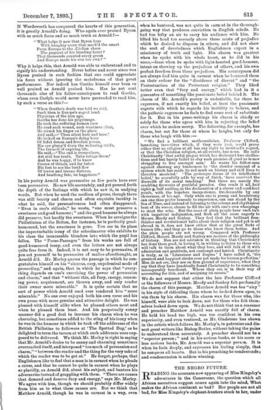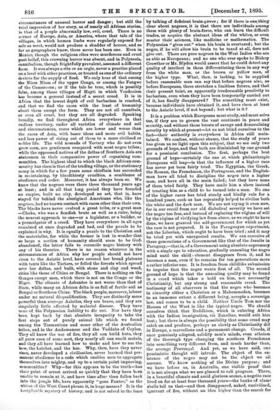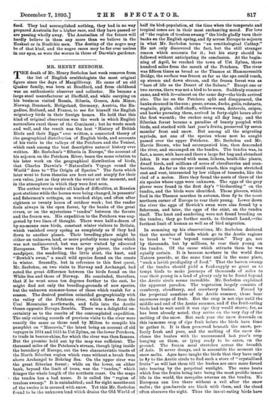THE NEGRO FUTURE.
READING the accounts now appearing of Miss Kingsley's adventures in the Cameroonp, the question which all African narratives suggest comes again into the mind, What makes the African continent so bad P Her people are not all bad, for Miss Kingsley's elephant-hunters stuck to her, under circumstances of unusual horror and danger; but still the total impression of her story, as of nearly all African stories, is that of a people abnormally low, evil, cruel. There is no corner of Europe, Asia, or America, where that tale of the villages, in which human limbs were regularly exposed for sale as meat, would not produce a shudder of horror, and so far as geographers know, there never has been one. Even in Mexico, though the religious rites were murderous and cruel past belief, this crowning horror was absent, and in Polynesia, cannibalism, though frightfully prevalent, assumed a different form. It was always a rite or an orgie, never a practice placed on a level with other practices, or treated as one of the ordinary devices for the supply of food. We only hear of that among the Niam Niam of the upper Congo, or among the Fangwe of the Cameroons; or if the tale be true, which is possibly false, among those villages of Hayti in which Voodooism has become a general instead of a secret creed. It is in Africa that the lowest depth of evil barbarism is reached, and that we find the races with the least of humanity about them except the form. They are not all cannibals, or even all cruel, but they are all degraded. Speaking broadly, we find throughout Africa everywhere in that endless territory, under all varieties of climate and soil and circumstances, races which are lower and worse than the races of Asia, with baser ideas and more evil habits, and less power of rising out of them to a more civilised or nobler life. The wild nomads of Tartary who do not even grow corn, are gentlemen compared with most negro tribes ; while the oppressed natives of the deltas of Southern Asia are statesmen in their comparative power of organising com- munities. The highest ideal to which the black African com- munity has risen is that of the trading village, or the stationary camp in which for a few years some chieftain has succeeded in maintaining, by bloodthirsty cruelties, a semblance of obedience and order. Moreover, it has always been so. We know that the negroes were there three thousand years ago at least ; and in all that long period they have founded no empire, built no city, developed no art, that is, have stayed far behind the aboriginal Americans who, like the negroes, had no known contact with races other than their own. The blacks have never evolved a great tribe, or a great man —Chaka, who was a fiendish brute as well as a ruler, being the nearest approach to one—or a legislator, or a builder, or a promulgator of a creed. They have everywhere in all ages remained at once degraded and bad, and the puzzle to be explained is why. It is equally a puzzle to the Christian and the materialist, for while the former is lost in wonder that so large a section of humanity should seem to be God- abandoned, the latter fails to reconcile negro history with any of his theories. There is no reason whatever in the circumstances of Africa why her people should not have risen to the Asiatic level, have covered her broad plateaus with tents like the Tartars, or felled the forests which spread over her deltas, and built, with stone and clay and wood, cities like those of China or Bengal. There is nothing on the Ganges except men, which there is not on the Congo or the Niger. The climate of Ashantee is not worse than that of Siam, while many an African delta is as full of fertile soil as Bengal or Southern China. The black people, moreover, labour under no natural disqualification. They are distinctly more powerful than average Asiatics, they are brave, and they are singularly little affected by malarial disease. They have none of the Polynesian liability to die out. Nor have they been kept back by that absolute incapacity to take the first steps out of purely animal life which we found among the Tasmanians and some other of the Australian tribes, and in the Andamanese and the Veddahs of Ceylon. They all know the use of fire, they all can build huts, they all grow corn of some sort, they nearly all can smelt metals, and they all have learned how to make and how to use the bow, the hatchet, and the hoe. Why, then, have they never risen, never developed a civilisation, never learned that per- manent obedience to a code which enables men to aggregate themselves into mighty, and up to a certain point improving, communities ? Why--for this appears to be the truth—has their point of arrest arrived so quickly that they have been unable to remain at it, and have time after time fallen back into the jungle life, have apparently "gone Fantee," as the whites of the West Coast phrase it, in huge masses ? It is the I ieexplicalae mystery of history, and is not solved in the least
by talking of deficient brain-power ; for if there is one thing clear about negroes, it is that there are individuals among them with plenty of brain-force, who can learn the difficult trades, or acquire the abstract ideas of the whites, or even master their sciences, like medicine or mathematics. The Polynesian "gives out" when his brain is overtaxed; but the negro, if he will allow his brain to be taxed at all, does not give out. There are pure negroes in the West Indies who are as able as Europeans; and no one who ever spoke to Bishop Crowther or Mr. Blyden would assert that he could detect any quality of intellect in them differentiating them in any way from the white man, or the brown or yellow man, of the higher type. What, then, is lacking, to be supplied before reasonable men can say that before negroes also, as before Europeans, there stretches a limitless future, and that their present taint, an apparently irredeemable proclivity to barbarism, even when they have been temporarily carried out of it, has finally disappeared ? The something must exist, because individuals have obtained it, and have risen at least to the Asiatic level, if not beyond; but what is it ?
It is a problem which Europeans must study, and must solve too, if they are to govern the vast continent in peace and security, and without those bursts of savage and demoralising severity by which at present—let us not blind ourselves to the fact—their authority is everywhere in Africa still main- tained. We confess, without shame, that the study of years has given us no light upon this subject, that we see only two grounds of hope, and that both are diminished by one ground for a pessimist conclusion. The first, perhaps the best ground of hope—certainly the one at which philanthropic Europeans will leap—is that the influence of a higher race has never yet been fairly tried. The Egyptian, the Greek, the Roman, the Frenchman, the Portuguese, and the English- man have all tried to discipline the negro into a higher man, and have all in the main failed ; but they have none of them tried fairly. They have made him a slave instead of treating him as a child to be turned into a man. No one of the higher races has tried steady and kindly rule for a hundred years, such as has repeatedly helped to civilise both the white and the dark man. We are not trying it even now, for in our recoil from our old diabolical severity we have set the negro too free, and instead of replacing the regime of will by the regime of vivifying law from above, as we ought to have done, we have granted the self-government for which as yet the race is not prepared. It is the Paraguayan experiment, not the Liberian, which ought to have been tried ; and it may be tried yet with unexpected results. We can conceive of three generations of a Government like that of the Jesuits in Paraguay,—that is, of a Government using absolute supremacy with a single eye to education, gradually annealing the negro mind until the child - element disappears from it, and he becomes a man, even if he remains for ten generations more a rather inferior one. It is freedom from childlike submission to impulse that the negro wants first of all. The second ground of hope is that the annealing quality may be found in a creed which takes a hold on him, not necessarily Christianity, but any strong and reasonable creed. The testimony of all observers is that the negro who becomes in sincerity either a Christian or a Mahommedan, becomes to an immense extent a different being, accepts a sovereign law, and ceases to be a child. Neither Uncle Tom nor the Houssa of the West is like the typical negro. We should ourselves think that Buddhism, which is entering Africa with the Indian immigration, via Zanzibar, would suit him best ; but there is always the possibility that some creed may catch on and produce, perhaps as slowly as Christianity did in Europe, a marvellous and a permanent change. Creeds, if once genuinely adopted, solidify men's minds, even atheism of the thorough type changing the southern Frenchman into something very different from, and much harder than, the average Provençal. And yet, as we have said, one pessimistic thought will intrude. The object of the ex- istence of the negro may not be the object we all assume. We know nothing of the Divine purpose ; and we have before us, in Australia, one visible proof that it is not always what we are pleased to call progress. There, in a beautiful climate and amid glorious scenes, a negrito race lived on for at least four thousand years—the banks of clams shells tell us that—and then disappeared, naked, uncivilised, ignorant of fire, without an idea higher than the search for food. They had accomplished nothing, they had in no way prepared Australia for a higher race, and they have passed or are passing wholly away. The Australian of the future will hardly believe in them any more than we believe in the Euskari or in Neolithic men. The destiny of the negro may be of that kind, and the negro races may be for ever useless in our eyes, as were the worms in those of Darwin's gardener.
























































 Previous page
Previous page